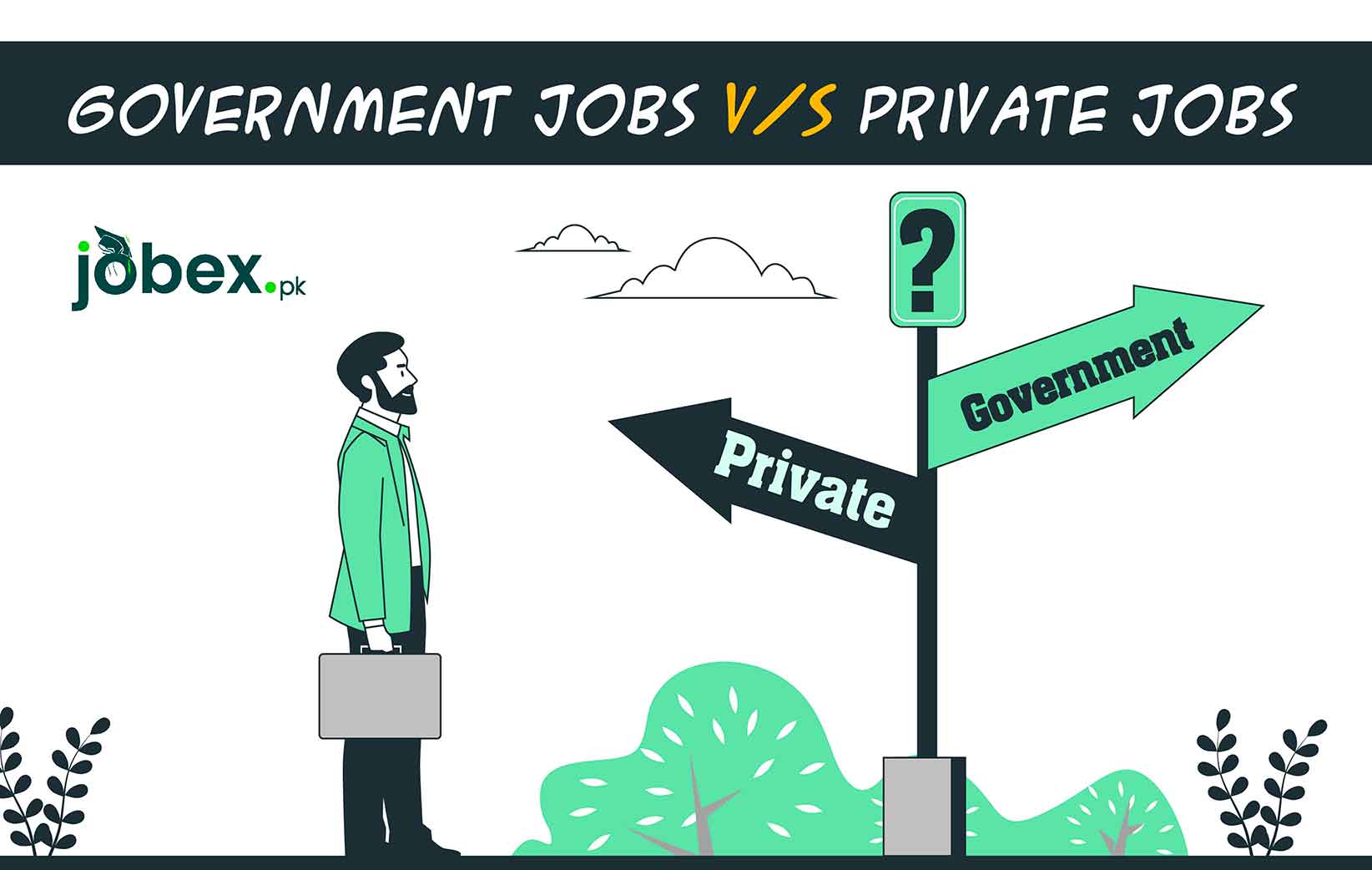Introduction:
In Pakistan, the choice between government and private sector employment is a crucial decision for many individuals entering the job market. Each sector offers distinct advantages and disadvantages, shaping the career paths and lifestyles of millions. This article aims to provide a comprehensive comparison of government and private jobs in Pakistan, considering various factors such as job security, salary, perks, work environment, career growth, and societal perceptions.
1. Job Security:
Government Jobs:
- Generally, government jobs in Pakistan are perceived to offer higher job security compared to the private sector.
- Employees are protected by labor laws, making it difficult for the government to terminate them arbitrarily.
Private Jobs:
- Job security in the private sector is often contingent upon company performance and market conditions.
- Downsizing and layoffs are more common in private companies, especially during economic downturns.
2. Salary and Benefits:
Government Jobs:
- Government jobs typically offer fixed salary structures determined by pay scales and grades.
- Benefits may include pensions, healthcare coverage, housing allowances, and education allowances for children.
Private Jobs:
- Salaries in the private sector can vary widely based on industry, company size, and individual negotiation skills.
- Benefits may include bonuses, performance incentives, health insurance, and retirement plans, but they may not be as comprehensive as those in the public sector.
3. Work Environment:
Government Jobs:
- Bureaucratic structures and processes often characterize the work environment in government offices.
- Decision-making can be slow due to red tape and hierarchical systems.
Private Jobs:
- Work environments in the private sector tend to be more dynamic and fast-paced, driven by market demands and competition.
- There may be greater flexibility in work hours and practices, depending on company culture and policies.
4. Career Growth and Opportunities:
Government Jobs:
- Career progression in government jobs is typically based on seniority and merit.
- Promotions may be slow and competitive, with limited opportunities for rapid advancement.
Private Jobs:
- Career growth in the private sector can be faster-paced, with opportunities for advancement based on performance and skills.
- Employees may have access to training programs and professional development opportunities to enhance their careers.
5. Societal Perceptions:
Government Jobs:
- In Pakistani society, government jobs are often highly esteemed due to their perceived stability and prestige.
- Government employees may enjoy greater social status and respect, particularly in rural areas.
Private Jobs:
- Private sector employment is increasingly valued, especially in industries such as technology, finance, and multinational corporations.
- Entrepreneurship and innovation in the private sector are gaining recognition and respect among the younger generation.
6. Recruitment Process:
Government Jobs:
- The recruitment process for government jobs in Pakistan often involves competitive examinations, interviews, and merit-based selection criteria.
- The process can be lengthy and bureaucratic, with strict eligibility requirements and sometimes political influences.
Private Jobs:
- Private sector recruitment processes vary widely depending on the industry and company policies.
- Hiring may be based on interviews, technical assessments, and referrals, with a focus on skills, experience, and cultural fit.
- Private companies may offer more flexibility in recruitment, allowing them to adapt quickly to changing business needs.
7. Work-Life Balance:
Government Jobs:
- Government employees in Pakistan often enjoy better work-life balance compared to their counterparts in the private sector.
- Standard working hours and generous leave policies contribute to a more predictable schedule and time for family and personal activities.
Private Jobs:
- Work-life balance in the private sector can vary significantly depending on the industry, company culture, and individual job roles.
- Some private companies prioritize employee well-being and offer flexible working arrangements, while others may have demanding workloads and tight deadlines.
8. Innovation and Creativity:
Government Jobs:
- Government institutions in Pakistan are traditionally perceived as bureaucratic and resistant to change, which can hinder innovation and creativity.
- Decision-making processes may be slow, and there may be limited incentives for employees to propose new ideas or initiatives.
Private Jobs:
- The private sector is often more conducive to innovation and creativity, driven by market competition and the need to stay ahead of competitors.
- Employees may have more autonomy to experiment with new approaches and solutions, fostering a culture of innovation and entrepreneurship.
9. Job Diversity and Specialization:
Government Jobs:
- Government employment in Pakistan offers a wide range of job opportunities across various sectors such as administration, education, healthcare, and law enforcement.
- However, specialization and career progression within specific fields may be limited by rigid hierarchical structures.
Private Jobs:
- The private sector encompasses diverse industries and roles, providing opportunities for individuals to specialize in niche areas and pursue their interests.
- Employees may have the chance to gain expertise in emerging fields and technologies, enhancing their marketability and career prospects.
10. Economic Stability:
Government Jobs:
- Government jobs are often perceived as more resilient during economic downturns, as public sector salaries and benefits are less likely to be affected by market fluctuations.
- However, government spending cuts or austerity measures may lead to hiring freezes or downsizing in certain sectors.
Private Jobs:
- Private sector employment in Pakistan is more directly influenced by economic conditions, with businesses experiencing fluctuations in demand and profitability.
- Economic instability can result in layoffs, salary cuts, or reduced benefits, making private sector jobs more vulnerable during times of recession.
11. Job Mobility and Transferability:
Government Jobs:
- Mobility and transferability within government jobs in Pakistan can be limited by bureaucratic regulations and departmental constraints.
- Transfers may be subject to approval processes and seniority-based considerations, which can hinder career flexibility and geographical mobility.
Private Jobs:
- Private sector employees often have more flexibility to change roles, departments, or even companies based on their career goals and market opportunities.
- Transferability of skills and experiences acquired in the private sector may also be more readily recognized and valued by other employers, both domestically and internationally.
12. Retirement Benefits:
Government Jobs:
- Government employees in Pakistan typically enjoy comprehensive retirement benefits, including pensions and gratuity payments.
- Retirement packages are often structured according to length of service and pay scale, providing financial security for retirees.
Private Jobs:
- Retirement benefits in the private sector vary depending on company policies and may include provident funds, employee savings schemes, or employer-contributed pension plans.
- While private sector retirement benefits may be less standardized compared to government pensions, employees may have the opportunity to maximize savings through employer matching contributions and investment options.
13. Training and Development:
Government Jobs:
- Training and development opportunities for government employees in Pakistan may be limited by budgetary constraints and institutional inertia.
- Professional development programs and skill enhancement initiatives may be less prioritized compared to the private sector.
Private Jobs:
- Many private companies in Pakistan invest in training and development programs to enhance employee skills and competencies.
- Employees may have access to workshops, seminars, online courses, and mentoring programs to support their career growth and performance improvement initiatives.
14. Job Satisfaction and Fulfillment:
Government Jobs:
- Job satisfaction in government jobs in Pakistan may vary depending on factors such as job role, work environment, and organizational culture.
- Some individuals may find fulfillment in serving the public interest and contributing to national development through government service.
Private Jobs:
- Job satisfaction in the private sector is influenced by factors such as organizational culture, job autonomy, and alignment of personal values with company mission.
- Opportunities for innovation, recognition, and career advancement may contribute to higher levels of job satisfaction among employees in certain private sector roles.
15. Impact on Society:
Government Jobs:
- Government employees in Pakistan often have the opportunity to directly impact society through policy-making, public service delivery, and regulatory enforcement.
- Serving in government roles can offer a sense of civic duty and responsibility, contributing to the welfare and development of the country.
Private Jobs:
- While private sector jobs may not always have as direct a societal impact as government roles, they play a crucial role in driving economic growth, employment generation, and innovation.
- Private sector initiatives in areas such as corporate social responsibility (CSR) can also contribute to positive social change and community development.
Conclusion:
the choice between government and private sector employment in Pakistan entails weighing various factors that significantly influence individuals’ career trajectories and lifestyles. Through this comparative analysis, several key insights emerge.
Firstly, job security is a critical consideration, with government jobs generally perceived to offer greater stability due to protective labor laws, whereas private sector employment may be subject to market fluctuations and downsizing.
Secondly, salary and benefits vary between the two sectors, with government jobs offering fixed structures and comprehensive benefits, while private sector compensation can be more variable and may depend on negotiation skills and company performance.
Moreover, the work environment differs significantly, with government offices often characterized by bureaucratic processes and slower decision-making, contrasted with the dynamic, competitive atmosphere of the private sector.
Career growth and opportunities also diverge, as government jobs typically progress based on seniority and merit, while the private sector offers faster advancement opportunities driven by performance and skills.
Societal perceptions play a role, with government roles traditionally esteemed for their stability and prestige, while private sector employment gains recognition, particularly in industries like technology and finance.
Recruitment processes vary as well, with government jobs often involving competitive examinations and bureaucratic procedures, whereas private sector hiring may be more flexible and based on skills and cultural fit.
Work-life balance tends to favor government employees, whereas the private sector may offer more varied experiences depending on company culture and job roles.
Innovation and creativity thrive more in the private sector due to market competition, while government institutions may face challenges in adapting to change.
Job diversity and specialization are more pronounced in the private sector, offering opportunities for niche expertise and career development.
Economic stability differs between the sectors, with government jobs perceived as more resilient during downturns but subject to austerity measures, while private sector jobs are more directly impacted by market conditions.
Job mobility and transferability are generally higher in the private sector due to fewer bureaucratic constraints.
Retirement benefits are more standardized in government jobs, while private sector offerings vary depending on company policies.
Training and development opportunities may be more accessible in the private sector due to greater investment in employee growth.
Ultimately, job satisfaction and fulfillment depend on individual preferences and factors such as organizational culture and alignment with personal values.
Both government and private sector jobs have distinct impacts on society, with government roles directly influencing policy-making and public service, while the private sector drives economic growth and innovation, often through corporate social responsibility initiatives.
In making the choice between government and private sector employment in Pakistan, individuals must carefully consider these factors to align with their career goals, lifestyle preferences, and societal contributions.





